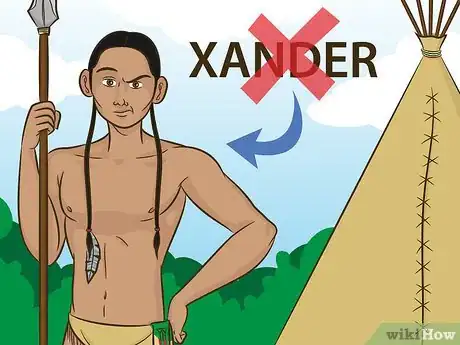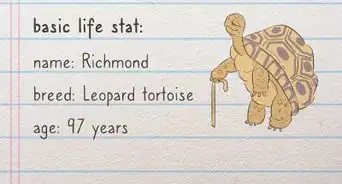This article was co-authored by Lucy V. Hay. Lucy V. Hay is a Professional Writer based in London, England. With over 20 years of industry experience, Lucy is an author, script editor, and award-winning blogger who helps other writers through writing workshops, courses, and her blog Bang2Write. Lucy is the producer of two British thrillers, and Bang2Write has appeared in the Top 100 round-ups for Writer’s Digest & The Write Life and is a UK Blog Awards Finalist and Feedspot’s #1 Screenwriting blog in the UK. She received a B.A. in Scriptwriting for Film & Television from Bournemouth University.
There are 9 references cited in this article, which can be found at the bottom of the page.
This article has been viewed 104,527 times.
Choosing a character name is often one of the most difficult steps in the writing process. The name needs to fit the character and be memorable for the reader. Thinking about the character’s age, location, and family, as well as the name meaning can help in the selection process. Picking a memorable name that will be easy for the reader to pronounce will help ensure you have characters that will suit your story and be relatable to your readers.
Steps
Considering the Character’s Background
-
1Choose time-period appropriate names. Think about what year the story is set in, and the age of your character. Pick a name that is suitable for the era of the story. Names that are currently popular may have been rare or not used at all in the past. [1]
- Yearbooks and old newspapers are a great place to find era-specific names. They are especially useful for finding names that were used in a certain era in a particular town, region, or country.
- The Social Security Administration website is a great resource for authors if your character is from the United States. It has a name popularity page that lists the 200 most popular names, for boys and girls, for each decade since 1880. You can also search by year or individual name. This is an easy way to determine what names were used in a particular time-frame in the United States.
- Many other countries have similar resources, such as Statistics Sweden[2] or the Department of Internal Affairs in New Zealand.[3] Check to see if the country of your character has a similar site.
-
2Consider the character’s location and historical context. If your story is set in feudal Japan, a name like Andrew or Jennifer will probably not be appropriate. Likewise, a character from Spain is more likely to be named Isabella than Elizabeth.[4]
- Many names have different variations in different languages. A character from England named Mary, could be named Marie in France or Maria in Italy. Many different websites, such as behindthename.com, offer a name translator where you can enter a name and then see its form in many languages. Use these tools to find names that are appropriate for the geographic setting of your story.
- If you do choose an unusual name for your character’s place or time, explain it. Did they find it difficult growing up with a unique name? Where did they get their name? Incorporate the story of the name into the character’s backstory.
Advertisement -
3Think about the character’s parents. Usually people are named by their parents. What were your character’s parents like? Was the character named after a friend or hero of their parents? Or does their name express an aspect of their parent’s personality?[5]
- For instance, if the parents are traditional then perhaps the character is named after their mother or father. If the parents were environmentalists, perhaps they named their child Rainbow, Forest, or River. Thinking about the motivations and interests of the parents might lead you to the character’s name.
Incorporating Character Traits into the Name
-
1Use names that express the character’s personality. This doesn’t necessarily mean that the characters must be named “Courage” or “Honesty.” Look for names that have the meaning you want to express.[6]
- For instance, Caleb is derived from the Hebrew words meaning loyalty or devotion. Baby name books list the origin and meaning of names from many cultures.
- Baby name websites let you search either by name or by meaning. If you have a trait you want the name to express, you can enter that into the baby name website to get ideas. For instance, entering “kindness” returns results including Adelaide, Kevin, Rahim, and Shiva. This might lead you to names you would not have considered otherwise.[7]
-
2Think about names that relate to the character’s occupation. If you are having trouble naming a character, think about their job or interests. Look up names that reflect these things; one of these names may fit your story.
- If you don’t want to be too literal, think about names that are related to their job or interest and hobbies. For example, if they are a florist, it may feel too obvious to name them after a flower like Hyacinth or Sage, but a common name like "Rose" won't sound unusual and still refers to a flower.
-
3Consider using nicknames. Think about your character’s personality. Are they formal or informal? Also reflect on who they will be interacting with in the story. Close friends and family are less likely to call the character by their full name.[8]
- Think about what names could easily have nicknames. Perhaps you like the name Alexander for your hero because it means “defender of men.” However, it may seem too formal if your character is a teenager or laid back. Consider using Alex, Al, or Alexei as nicknames.
Making the Name Easy for the Reader
-
1Ensure the name is easy to pronounce. This is especially important if you are writing a science-fiction or fantasy story. It may be tempting to create an exotic name, but make sure it is easy for the reader. Try saying the name out loud to see how easy or difficult it is to pronounce.[9]
- Many people read aloud, say the characters names to themselves, or listen to audio versions of stories. If a name is hard to pronounce or overly complicated it will make it harder to focus on the story.
- Combining two common names is a great way to make a unique, but still pronounceable name. For example, you could mix Donna and Veronica and name your character Donica.
- Mythology is also a great source for unique names that are still pronounceable such as Ceres, Freya, or Castor.
-
2Avoid using similar names for different characters. Using names that rhyme or sound similar will be confusing to your readers. Try using distinct names that start with different letters or sounds.[10]
- Using similar names like Tim and Tom, names that rhyme like Sherry or Carrie, or names that sound similar like Kelsey or Chelsea can be confusing for the reader.
- Say all the character names out loud to make sure they are not too alike.
-
3Avoid names with famous associations. Characters with the same name as famous individuals will remind readers of these celebrities. This could detract from your story and make it harder for readers to understand the character.[11]
- Unusual names like Madonna, Elvis, Beyonce, or Adolph are associated with famous individuals and it may be hard to differentiate them from your character.
- If you do choose a famous name, make that a part of the story. Was your protagonist named Elvis because his father was a big fan of Elvis Presley? Is she named Maryam because her mother is a scientist? Make sure to explain the backstory to the name if the character is very obviously named after someone famous.
Community Q&A
-
QuestionWhat name is good for a Japanese woman?
 Community AnswerLoves Earth: Midori, Loves Water: Una. Loves Fire: Akatsuki. Loves Animals: Tori.
Community AnswerLoves Earth: Midori, Loves Water: Una. Loves Fire: Akatsuki. Loves Animals: Tori. -
QuestionWhat will be a good name I should give to my antagonist who is a jealous and ruthless.
 Community AnswerChoosing a name comes down to what you, as the author, feels fits your story and character. If you want to emphasize the antagonist's jealousy and ruthlessness, look up names by meaning on a baby name website. For example, Nassir, Livius, and Zavis all mean envy. Look up different names by different meanings that relate to your character and see if any of the names work for your story.
Community AnswerChoosing a name comes down to what you, as the author, feels fits your story and character. If you want to emphasize the antagonist's jealousy and ruthlessness, look up names by meaning on a baby name website. For example, Nassir, Livius, and Zavis all mean envy. Look up different names by different meanings that relate to your character and see if any of the names work for your story. -
QuestionWhat is a good name for a robotic human?
 Community AnswerDepending on your book, it could be any number of things. If the creator wants the robot to fit in, they might deliberately choose a fairly popular name like "Jane," or "Sam." They may also have a pseudonym such as X3-2006 used by scientists/researchers/whoever created him/her.
Community AnswerDepending on your book, it could be any number of things. If the creator wants the robot to fit in, they might deliberately choose a fairly popular name like "Jane," or "Sam." They may also have a pseudonym such as X3-2006 used by scientists/researchers/whoever created him/her.
References
- ↑ http://www.writersdigest.com/online-editor/the-7-rules-of-picking-names-for-fictional-characters
- ↑ http://www.scb.se/en/finding-statistics/statistics-by-subject-area/population/general-statistics/name-statistics/
- ↑ https://www.dia.govt.nz/diawebsite.nsf/wpg_URL/Services-Births-Deaths-and-Marriages-Most-Popular-Male-and-Female-First-Names?OpenDocument
- ↑ http://writersrelief.com/blog/2011/10/how-to-pick-the-right-names-for-your-characters/
- ↑ http://writersrelief.com/blog/2011/10/how-to-pick-the-right-names-for-your-characters/
- ↑ http://writersrelief.com/blog/2011/10/how-to-pick-the-right-names-for-your-characters/
- ↑ https://www.behindthename.com/names/meaning/kind
- ↑ https://characternames.com/
- ↑ https://nybookeditors.com/2016/04/how-to-choose-character-names/



































































